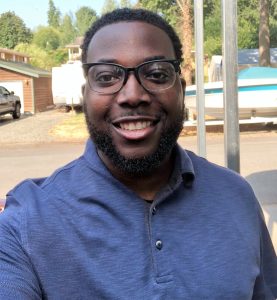
Email: jisaacjr@ufl.edu
Address: CS Building, E445
Education
Ph.D. in Human-Centered Computing
University of Florida
Gainesville, FL
Graduated on December 2023.
M.S. in Information Technology
University of Maryland University College
Adelphi, MD
Graduated on May 2013.
B.S. in Computer Science
University of Maryland, College Park
College Park, MD
Graduated on May 2010.
Research Interests
- K-12 Computing Education
- Culturally Relevant Pedagogy
- Culturally Responsive Teaching
- Authentic Learning
- Computational Thinking
- Learning Technologies
Current Projects
- Black Boy Joy
- This project is my dissertation work where I am investigating effective pedagogies to increase the interest and persistence of black middle school boys in computer science (CS) in the United States. It will identify significant factors for low interest and low persistence of black boys in computer science through existing literature, examine effective strategies for black boys participating in computer science, and conduct experiments to measure the effectiveness of strategies and pedagogies for increasing the participation of black boys in computer science.
Past Projects
- CodingBeats
- This project explored new ways to teach computer programming concepts (sequences, loops, parallelization, booleans, etc.) to middle and high school students using their own knowledge and interests in music production and solving puzzles.
- Kodu
- This project explored developing a computer science curriculum using Microsoft Kodu Game Lab (a programming environment that enables kids create games on the PC via a simple visual programming language) to teach computer programming to elementary school students. We have primarily conducted studies to understand students’ mental models from learning from our pedagogy.
Grants and Scholarships
- L3Harris Corporation Graduate Fellowship – UF CISE Recipient (Spring 2022)
- L3Harris Corporation Communication Graduate Fellowship – UF CISE Recipient (Spring 2021)
- Gartner Group Graduate Fellowship – UF CISE Recipient (Spring 2020)
- The Dissertation Institute – Participant (Summer 2019)
- Ford Foundation Predoctoral Fellowship – Honorable Mention (2018)
- Microsoft Research PhD Fellowship – Finalist (2017)
- Alpha Epsilon Lambda (AEL), National Honor Society – UF Chapter Inductee (Spring 2017)
- Ford Foundation Predoctoral Fellowship – Honorable Mention (2017)
- GEM Fellowship, National GEM Consortium – Fellowship Recipient (2016)
- Graduate School Fellowship Award, University of Florida – Fellowship Recipient (2016)
- Diversity Fellowship, Clemson University – Fellowship Recipient (Fall 2014 – Spring 2016)
- Upsilon Pi Epsilon (UPE), International Honor Society – UMUC Chapter Inductee (Spring 2013)
Teaching Experience
As Instructor
- Software Development Foundations (Clemson University, Spring 2016)
As a Teaching Assistant (TA)
- User Experience Design (University of Florida)
- Fall 2017, Fall 2020, Spring 2021, Fall 2021, Fall 2022
- Human-Computer Interaction (University of Florida)
- Spring 2018 & Fall 2022
- Software Development Foundations (Clemson University, Fall 2014 – Fall 2015)
Publications
- Isaac Jr, J. & Gardner-McCune, C. (2021). “Developing Introductory Computer Science Pedagogy for Black Boys”. RESPECT.
- Isaac Jr, J., Jimenez, Y., & Gardner-McCune, C. (2020). “Engaging 4th and 5th Grade Students with Cultural Pedagogy in Introductory Programming”. RESPECT.
- Touretzky, D. S., Gardner-McCune, C., Isaac Jr, J., & Tomokiyo, L. (2018). “Couplets: Helping Elementary School Students Recognize Structure in Code”. SIGCSE.
- Rodrıguez, F. J., Price, K. M., Isaac Jr, J., Boyer, K. E., & Gardner-McCune, C. “How Block Categories Affect Learner Satisfaction with a Block-Based Programming Interface”. (2017). Visual Languages and Human-Centric Computing.
- Daily, S. B., James, M. T., Cherry, D., Porter, J. J., Darnell, S. S., Isaac, J., & Roy, T. (2017). Affective Computing: Historical Foundations, Current Applications, and Future Trends. In “Emotions and Affect in Human Factors and Human-Computer Interaction” (pp. 213-231).
- Isaac, J., Babu, S., Parmar, D., Daily, S., Leonard, A., Jörg, S., D’Souza, N., Gundersen, K. (2016). “Supporting Computational Thinking through Gamification”. IEEE 3DUI Symposium.
- Parmar, D., Isaac, J., Babu, S., D’Souza, N., Leonard, A., Jörg, S., Gundersen, K., Daily, S. (2016) “Programming Moves: Design and Evaluation of Applying Embodied Interaction in Virtual Environments to Enhance Computational Thinking in Middle School Students“. IEEE Virtual Reality.
- Daily, S., Leonard, A., Jörg, S., Babu, S., D’Souza, N., Parmar, D., Gundersen, K., Isaac, J. (2016) “Combating Perceptions of Computer Scientists: A Short-term Intervention“. SIGCSE.
